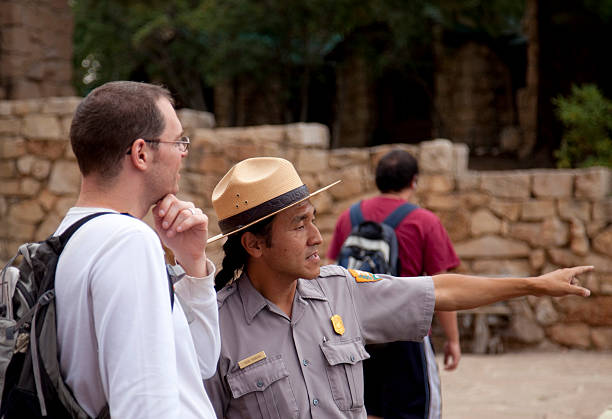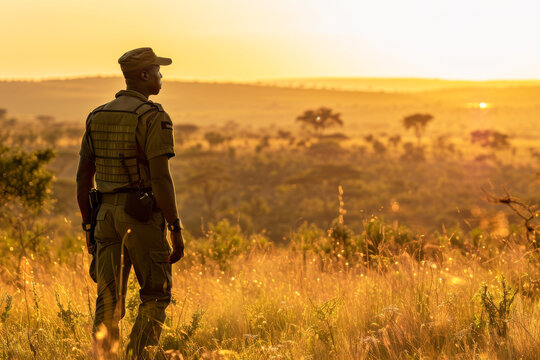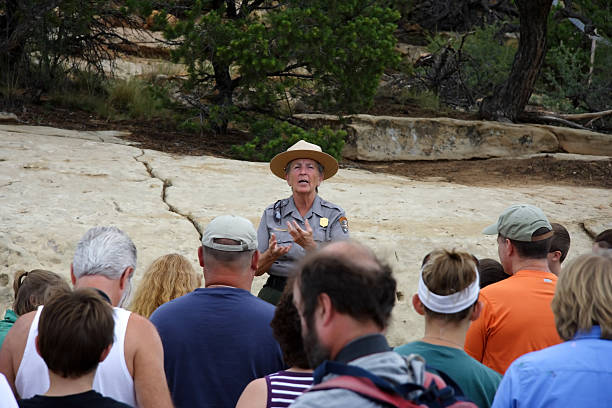As a seasoned park ranger, I’ve witnessed firsthand the diverse range of roles my colleagues and I perform to protect nature and ensure the safety and enjoyment of visitors in state parks. From educational programs to emergency response, park ranger duties are as varied as the landscapes we serve. Unlike a correctional officer, our work extends beyond enforcing rules; it’s about fostering a deep appreciation for the natural world.
Whether patrolling vast wilderness areas or guiding tours through historic sites, park rangers are the stewards of our nation’s natural and cultural treasures. The scope of our work encompasses conservation efforts, visitor education, and sometimes law enforcement, each role crucial for preserving these treasured places for generations to come.
The Core Responsibilities of Park Rangers
At the heart of a park ranger’s mission is the commitment to safeguard wildlife, provide education, manage fires, and assist visitors. Balancing these responsibilities requires a keen understanding of the environment and a dedication to public service, ensuring that every person who visits our parks has a safe and informative experience.
The Work Environment and Locations of Park Rangers
Park rangers find their home in a variety of settings, from the awe-inspiring expanses of national parks to the more intimate confines of local nature preserves, each unique in its challenges and rewards.
• National Park Service
The National Park Service employs park guides and rangers who serve as the face of America’s national parks. These professionals work tirelessly to maintain the integrity of these iconic landscapes while educating the public on the importance of preserving such treasures for future generations.
• State Parks and Recreation
State parks offer a tapestry of natural wonders and recreational opportunities, managed by rangers who cater to the nuances of their region. These rangers ensure that state parks remain pristine sanctuaries for both wildlife and the community to enjoy.
• Regional and City Parks
Rangers in regional and city parks serve as the local guardians of green spaces, providing urban dwellers with a connection to nature. Their dedication ensures these parks remain vibrant community assets, fostering healthy lifestyles and environmental stewardship.
• Wildlife Refuges and Forests
Game wardens and rangers in wildlife refuges and forests are on the front lines of conservation, protecting species and habitats from harm. Their work is vital in maintaining the ecological balance and biodiversity that our natural landscapes depend upon.

Classification of Park Rangers
Rangers are classified by the systems they serve, each with distinct responsibilities that reflect the unique environments and objectives of their respective agencies.
• National Park Rangers
Commissioned rangers within the National Park Service are federal employees entrusted with preserving the sanctity of our nation’s most revered natural spaces. Their duties span across conservation, education, and enforcement, ensuring the parks’ enduring legacy.
• State Park Rangers
State park rangers, in contrast to national park rangers, operate within the realm of state governance, often with mandates tailored to their specific state’s natural resources and recreational needs. Their work is supported by both state and federal government initiatives aimed at conserving natural habitats.
• Forest Service Rangers
Forest Service rangers, or service rangers, are integral to the management and preservation of national forests. These rangers are tasked with protecting these lands while facilitating sustainable use for recreation, timber, and other resources.
• Recreation Area Rangers
Rangers within the national park system also oversee national recreation areas, ensuring these destinations are preserved for leisure and enjoyment. Their work supports a range of activities, from hiking to boating, across diverse recreation areas.
Specialized Roles Among Park Rangers
Beyond generalist roles, park rangers often specialize, catering their expertise to specific aspects of park management and visitor engagement.
• Interpretive Park Rangers
Interpretive park rangers blend education with entertainment, delivering guided tours and recreational programs that delve into the park’s natural and cultural stories. They craft both formal and informal experiences at visitor centers, helping guests connect with the park’s natural wonders and comply with park rules and regulations.
• Law Enforcement Park Rangers
Law enforcement rangers are commissioned law enforcement officers, trained in emergency medical response, resource management, and protective duties. Whether the park is located in a remote wilderness or a busy urban area, these rangers perform law enforcement duties vital to public safety and the integrity of parklands. Their expertise is often honed through specialized park ranger training, and they may collaborate with state agencies to uphold the law.
• Historic Site Rangers
Historic Site Rangers are stewards of the past, dedicated to preserving and interpreting sites with significant cultural heritage. They engage visitors with stories and facts about pivotal moments in history, ensuring the United States’ rich narrative is shared accurately and compellingly. Their expertise often extends to maintaining the integrity of historical structures and artifacts, making them invaluable in safeguarding the nation’s legacy.
• Battlefield Park Rangers
Battlefield Park Rangers specialize in areas where conflicts such as the Revolutionary War shaped the nation. They provide crucial context to the events that occurred on these hallowed grounds, offering educational tours and preserving the sanctity of these sites. Their role ensures that lessons from the past remain accessible and relevant for future generations.

Wildlife-Focused Park Ranger Positions
Wildlife-focused Park Ranger positions are integral to the conservation of natural habitats and the protection of biodiversity. Rangers in these roles combine field expertise with law enforcement to manage and safeguard wildlife populations, ensuring a balance between human activity and ecological preservation.
• Wildlife Conservation Rangers
Wildlife Conservation Rangers serve as game wardens and frontline defenders of wildlife conservation. Their duties span from monitoring species populations to enforcing regulations that protect wildlife from poaching and habitat destruction. They work tirelessly to maintain the delicate equilibrium of ecosystems, often collaborating with local communities and other conservation entities.
• Wildlife Refuge Rangers
In the role of a game warden within wildlife refuges, rangers are critical to implementing conservation strategies and managing land for the benefit of wildlife. They balance human recreation with the needs of the environment, ensuring that the natural habitats within the refuges are preserved for the diverse species that call them home.
Educational and Scientific Roles
Educational and scientific roles among park rangers are essential for fostering an understanding of the natural world among park visitors. These positions include experts who conduct research, manage data, and educate the public on the scientific aspects of park ecosystems and conservation efforts.
Education Specialists in Parks
Education Specialists in Parks, often acting as visual information specialists, curate engaging learning experiences for school groups and the general public. They develop materials and programs that both inform and inspire, emphasizing the importance of environmental stewardship and the wonders of the natural and cultural resources within state and national parks.
• Biological and Physical Science Technicians
Biological and Physical Science Technicians in national parks are vital to understanding and monitoring the health of ecosystems. They assist in research, contribute to volunteer programs, and gather critical data on flora and fauna. Their expertise in biological science and physical science supports informed management decisions and the overall mission of the National Park Service.
• Park Guides and Archeologists
Park Guides and Archeologists offer interpretive programs that delve into the rich tapestry of natural history and human civilization within parks. They bring to life the stories embedded in the landscape, from ancient geological formations to the remnants of past societies, enhancing the visitor experience with their depth of knowledge.
The Distinct Paths to Becoming a Park Ranger
Becoming a Park Ranger requires a blend of education, passion for the outdoors, and a commitment to conservation and public service. Each path is unique, with various entry points depending on the specific focus and the requirements of different park systems.
Necessary Certifications and Licenses
Aspiring Park Rangers considering law enforcement roles must complete law enforcement training, as rangers are considered law enforcement officials in many capacities. This training is critical for ensuring they have the skills to protect both the parks and the people who visit them. It includes understanding legal protocols, emergency response, and resource law enforcement.
Specialized Training for Park Ranger Roles
Specialized training for Park Ranger roles often includes courses in natural resource management, environmental education, and specific skills related to the ranger’s duties. This training ensures rangers are well-equipped to manage the challenges of conservation while providing a safe and informative environment for park visitors.

Enhancing Knowledge and Skills: Educational Programs for Aspiring Park Rangers
If you’re aiming to become a park ranger, advancing your education can be a powerful step. There are programs designed specifically to equip you with the knowledge and skills necessary for the diverse challenges of the job. Whether you’re looking at undergraduate or graduate studies, or seeking specialized training, the right educational program can set you on a path towards a rewarding career in park management and conservation.
Conservation Law Enforcement Degree Programs
For those keen on protecting our nation’s natural resources, a bachelor of science in Conservation Law Enforcement offers a comprehensive education. Students learn the basics of law enforcement, integrating environmental science with criminal justice. These programs prepare graduates to enforce regulations, ensuring the safety of both the public and the wildlife inhabiting our parks.
Environmental Studies and Sustainability Masters Programs
A Masters in Environmental Studies and Sustainability can take your understanding of ecological systems to the next level. Such programs often focus on the interrelationship between the environment, economy, and social systems, empowering you to develop sustainable solutions to environmental challenges. This degree can be especially beneficial for park rangers who aspire to leadership roles in conservation.
Hybrid Learning Opportunities in Environmental Fields
Hybrid learning programs combine online coursework with hands-on field experiences, providing a flexible yet robust educational path. For aspiring park rangers, these programs can offer the convenience of self-paced study along with the practical skills gained through fieldwork. This blend of learning environments is ideal for delving into subjects like resource management, environmental policy, and ecological conservation.
Conclusion: Types of Park Rangers
Park rangers play an indispensable role in conserving natural resources and educating the public on the importance of protecting nature. Whether they serve at the national level under the Department of the Interior or contribute to the preservation of municipal parks, their work is multifaceted, ranging from manual labor to interpretive talks that delve into the natural and cultural history of our lands.
Aspiring rangers typically undergo a thorough application process, which may include obtaining a master of science degree or participating in internships with organizations like the Student Conservation Association. From patrolling the park to ensure resource protection to acting as a conservation officer, park rangers are the guardians of our most treasured natural spaces, dedicating their lives to both the environment and the education of future generations.





